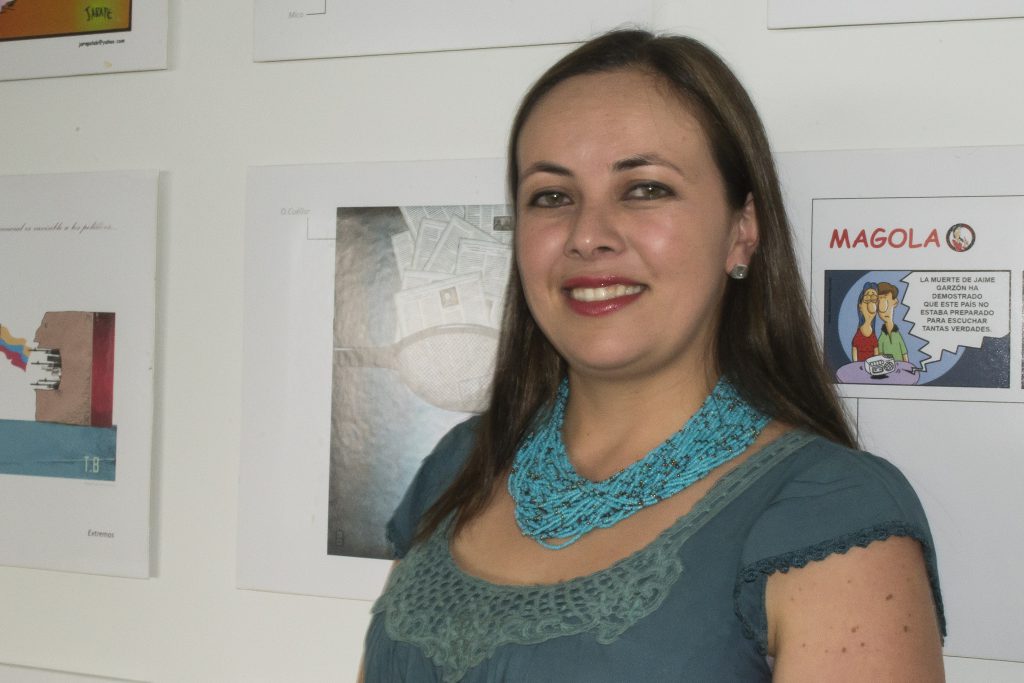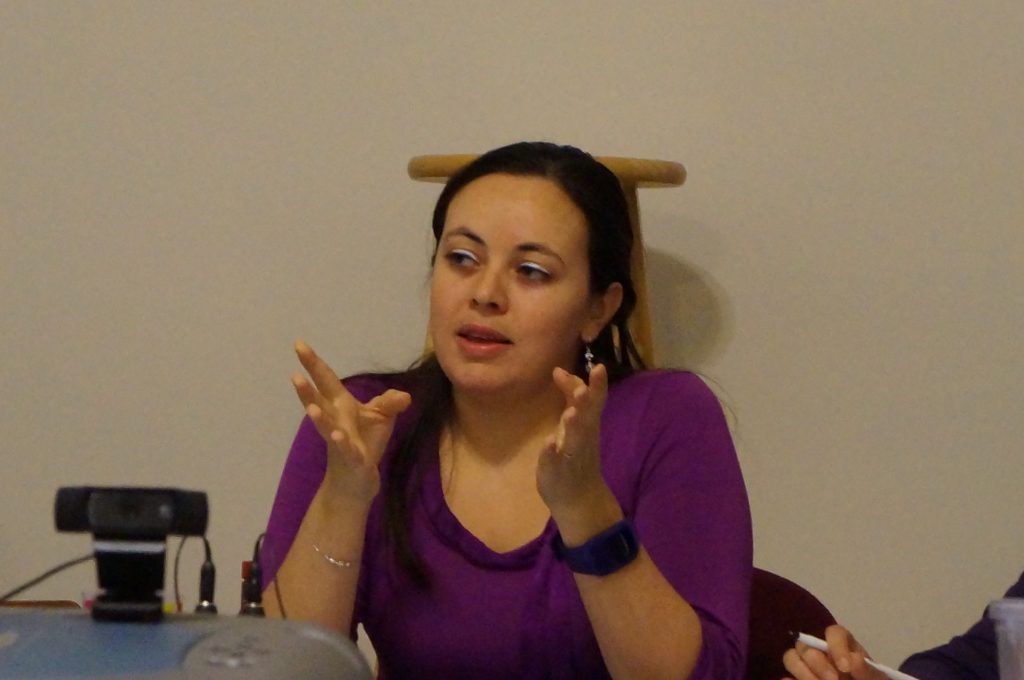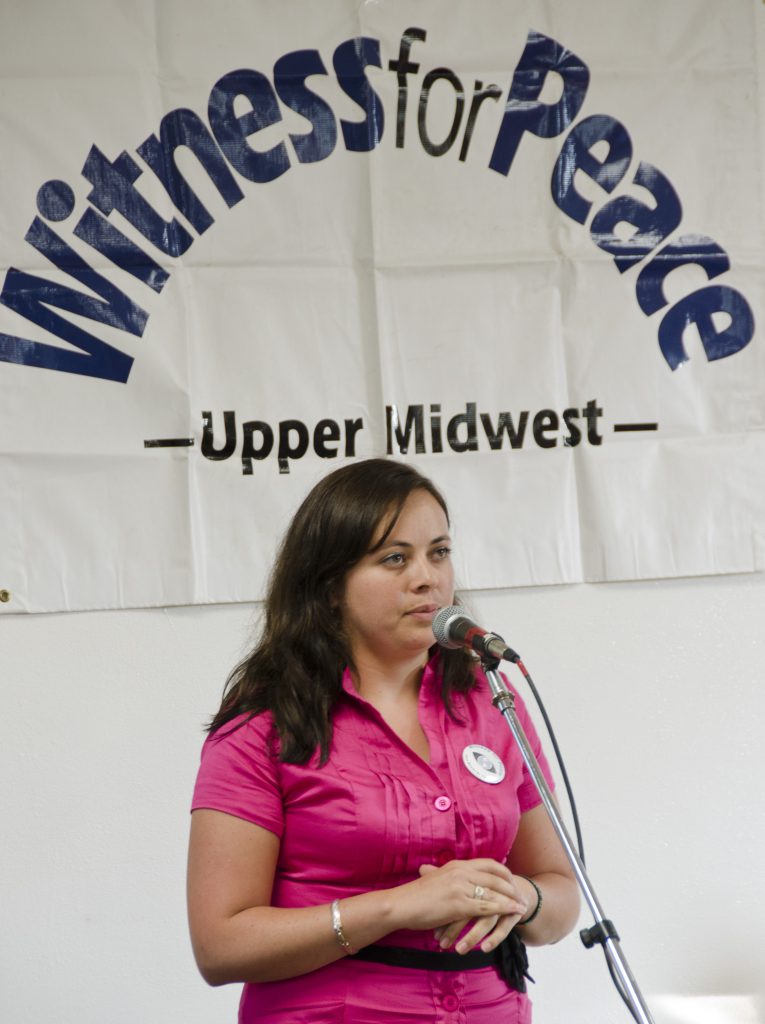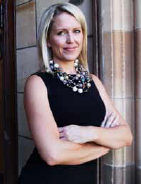
Be Just Fellow alumna (2013-15), Yessika Hoyos, works with Bertha Justice Initiative partner, the Jose Restrepo Alvear Lawyers Collective (CCAJAR) – Colombia’s pre-eminent human rights organization. In July, the Bertha Justice Initiative wrote to Colombian President Santos to raise concerns about the threats and intimidation Yessika has faced for her work seeking accountability for state crimes. We also made a joint nomination for Yessika for the 2016 International Bar Association Award for outstanding contribution by a legal practitioner to human rights, which will be decided in September.
This is the first of what we hope will be a series of Bertha fellow alumni profiles showing the remarkable, diverse and important human rights work Bertha fellows go on to do around the world after their fellowship experience.

“The message I want to send is that the defence of human rights does not make us guerillas or terrorists. All we are trying to do is construct a better country so that other people and other children don’t have to live through what we have had to live through.”
– Yessika Hoyos, Bertha fellow alumna and lawyer at CCAJAR
Yessika Hoyos was just 17 when it happened.
Her father, a well-known trade unionist, was murdered.
She had just commenced law school in Bogota. Having grown up with parents who were both leaders in the union movement in Colombia, Yessika had spent her childhood attending Labour Day marches and learning about human rights and social justice issues. Her father, Jorge Darío Hoyos Franco, was a key union figure and educator in Latin America. Her mother, an academic, led the local teachers’ union chapter in Fusagasuga. “In our house, we were always trained about the need to defend human rights,” she explains. It was her desire to help to defend people’s rights that led to her to a career in law.
But her father would never see her graduate. On 3 March 2001, her fourteen year-old sister would find him dead on a pavement – shot seven times in the head. A characteristically stoic and strong lawyer now fighting some of the toughest cases in Colombia, Yessika apologises as she breaks into tears telling me about the moment she learned of his death, “all these years later, it is still very hard for me to talk about it and re-live it.”
Over the years, Yessika’s father had suffered numerous threats directed at him because of his work. Funeral flower arrangements had been left outside their front door, bullets were left in his car and a note was left inside their house with black crosses – all clear death threats. But in the lead up to his murder, the threats had become more specific: local security forces had prepared a list of people to be killed, which had been broadcast on local radio, and her father’s name was on it.
For decades, social movements have been stigmatized in Colombia – wrongfully accused of being affiliated with the left-wing guerillas, the Revolutionary Armed Forces of Colombia (FARC-EP), and excluded from the democratic system. More than three thousand trade unionists have been killed, the highest murder rate in the world, and in ninety-eight percent of those cases there is no truth or justice: the perpetrators enjoy impunity. Throughout the 1980s and 1990s, Yessika’s father spoke out publicly about this problem in Colombia and around the world. He spoke forcefully about how the paramilitary structure was a part of – and a creation of – the state, being used to attack social movements, which has since been confirmed by the Inter-American Court. He also spoke of the need to dismantle the paramilitary structure if there was to be a solution to the conflict in Colombia. For his work, Yessika’s father was targeted.
His death only further motivated Yessika into this work. The day he was buried she gave a radio interview, “I was only 17, but I said I would carry my father’s flag to protect human rights. I said I would fight to seek justice for his death and I will not allow my father’s assassination to be yet another case of impunity in Colombia. I meant it then – and I will not stop now.”

After this, the threats began against Yessika and her family. Her mother received threatening phone calls telling her to “say goodbye” to Yessika because she was going to be put in a coffin. Her mother and sister had to relocate to Bogota – and have since had to move homes several times for security reasons.
Yessika went on to help build the movement of children seeking accountability for crimes committed against their parents during the conflict. For this work, in 2014 she was selected by the Universidad Nacional and the United Nations to be part of a delegation to give testimony in Havana before representatives of the Colombian Government – FARC-EP peace process.
As a law student, she took her father’s case to the Jose Restrepo Alvear Lawyers Collective (CCAJAR). Once she was admitted as a lawyer, Yessika joined CCAJAR to represent the trade unions and pursue her father’s case. She now leads CCAJAR’s trade union work seeking accountability and reparations for crimes committed against the trade union movement. She also represents victims of other grave human rights violations, including massacres (such as the massacre of La Sarna) and the so-called “false positives.”

Through her work at CCAJAR, she has been able to learn the truth about her father’s murder. She interviewed one of the men convicted of murdering him. She explains, “It was very hard for me to talk to him. But I needed the truth.” He told her that she was very courageous, so he would help her, but her life would be at risk. “It was then that he told me that my father’s assassination had been ordered by the police and the army,” she says.
Two police officers have since been convicted. Her case against Colombian intelligence official Freddy Francisco Espitia Espinosa was heard last week. In earlier proceedings in this case, a witness threatened her co-counsel, Mrs. Soraya Gutierez, a senior lawyer with CCAJAR. Yessika and Mrs. Gutierez were also subject to harassment inside the court after the hearing.
Yessika has suffered a pattern of harassment, but the threats have intensified in the past year as her case against Espinosa has progressed, prompting the Bertha Justice Initiative to write to President Santos to take action to ensure her protection. Despite the recent peace deal ending Colombia’s conflict, Yessika now faces the same risk as her father for her own work as a human rights defender.
Yessika is not alone in the security risks that she faces. CCAJAR lawyers have been threatened and persecuted for their work seeking accountability for crimes of state officials during the conflict, including being subjected to illegal surveillance. Former Colombian President Uribe branded CCAJAR as “a FARC collective.” Being stigmatized and branded part of FARC-EP is dangerous in a country where right-wing paramilitaries remain active and assassinations are common. For example, in September 2015 a pamphlet appeared in Colombia, written by a paramilitary group calling themselves ”The Black Eagles” (Las Aguilas Negras), threatening CCAJAR and other human rights groups.
In June 2015, Yessika personally became the target of this form of stigmatization. During the Europe-Latin American (EUROLAT) Parliamentary Assembly, two Members of European Parliament accused Yessika of being associated with FARC-EP during a EUROLAT Committee on Political Affairs, Security and Human Rights hearing. Despite being formally invited to represent Colombian civil society, she was censored from speaking and was refused the opportunity to defend herself and correct the record. Despite Yessika’s request, the Colombian ambassador refused to take up her complaint. “I told them if I was later killed that they would be responsible,” she says. This widely publicised vilification placed her personal safety and professional standing at risk.
Following these events in Brussels, the threats against Yessika at home intensified – and this time targeting her young family. In September 2015, strange men approached her nanny, asking questions about Yessika and her 20-month old daughter. The nanny had been working with Yessika for just over a week, revealing the level of surveillance her family is now under. A week later, Yessika’s new legal assistant, Sebastían Bojacá, was approached outside his home by strange men and warned to “look after himself.” Yessika says these events send a clear message: “they are letting me know that it is about me.”
In February 2016, CCAJAR wrote to President Santos about Yessika’s security situation, calling for urgent protection measures after they had “received highly credible information that sectors within military intelligence are plotting an attack against our colleague Yessika Hoyos Morales…a message was sent stating she should ‘stop bothering the generals.’”
Women lawyers and human rights defenders like Yessika face particular risks in Colombia. There is a clearly identifiable pattern of gendered attacks, including rape and threats of sexual violence, as well as threats directed at their children. As with attacks on trade unionists, there is impunity for sexual crimes against women. It is a tool that Yessika says is used to silence women in public life and to prevent them from seeking justice for state crimes.
This is not the first time women lawyers at CCAJAR and their children have been intimidated: in 2005, the life of the young daughter of Soraya Gutierrez was threatened when Soraya received a box in the post with a bloody, decapitated doll and a note saying “You have a pretty daughter. Don’t sacrifice her.” Evidence found during a 2010 investigation into Colombia’s notorious intelligence agency, DAS, suggests this action was carried out by the intelligence agency.
Yessika told me that for many years she didn’t want to have children because she knew, from watching what happened to other women, that it would be used against her. She became emotional acknowledging this is now her reality while contemplating what could happen to her or to her daughter: “I don’t want my daughter to have to go through what I have been through.”
When I asked Yessika if I could write about her story to raise awareness about the threats she and her colleagues face, she readily agreed. “We must show the world that despite the peace process, human rights defenders are still being persecuted and killed. Human rights defenders are being denounced and stigmatized – and assassinations follow.”
For Yessika and many other victims, telling her father’s story and her own story is important. Merely citing statistics on the numbers of people killed in Colombia during the conflict can never adequately describe the problem. “It dehumanizes and trivializes those who were killed and our loss. It does not describe my father, his story, his hopes and dreams for his life and for us, and the pain our family has suffered being left behind remembering him,” she says. It is obvious she is concerned that she might become another statistic.
 Jennifer Robinson, Director of Legal Advocacy for the Bertha Foundation
Jennifer Robinson, Director of Legal Advocacy for the Bertha Foundation
Follow Bertha Justice Initiative on Twitter @Be_Just_
Follow Jen Robinson on Twitter @suigenerisjen
Article Tags: Bertha Fellow alumni / CCAJAR / Colombia / Human Rights / International Human Rights / movement lawyering / security / women lawyers